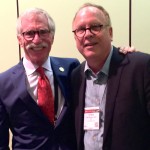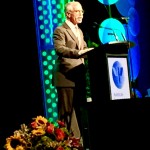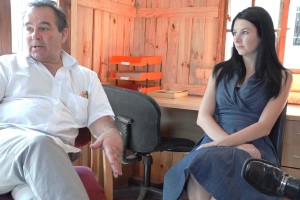Barry Anton (left and below center), APA President spoke of the ‘painful’ yet ‘necessary’ changes within APA in response to the recent outside consultant evaluation of the APA relationships with Washington DC. Fortunately, the blemish doesn’t overshadow the terrific work APA continues to do in setting up scholarship and training for doctoral students in accredited centers of health, education, and vocation. Barry introduced this year’s winner of the outstanding lifetime achievement award, Jonathan Kellerman, Psychologist/ Author. A terrific high school jazz band played for the enormous crowd of practitioners and professors who listened intently.
International work is what I do. APA provides me to mix with the international members, and this year new contacts with Peter Kinderman (on right), president elect for the British Psychological Society, and Dr Aceves and Dr. Cervantes from the Mexican Society of Psychology. APA sponsored an international get together with Mary Bullock as host. There is such a tremendous wealth in making relationships with psychologists from different countries. I am proud to be an APA member, as well as BPS member, and Toronto was perfect in bringing together psychologists from all over the world.





